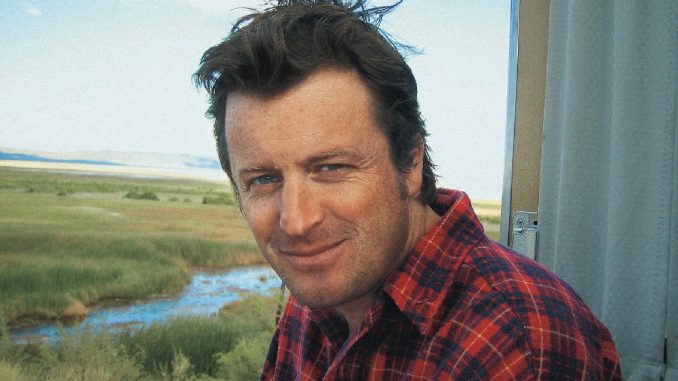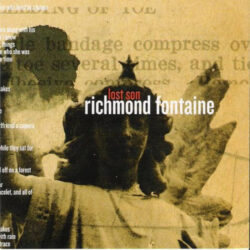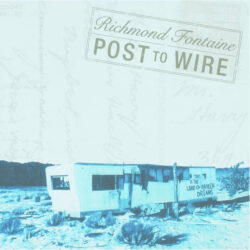
Richmond Fontaine was formed in Portland, Oregon, in 1994 and recorded eleven studio albums, four live albums and two EPs before calling it a day in 2016. There were various personnel in that time, but the one constant was guitarist and lead singer Willy Vlautin, who also wrote the songs. They are one of my favourite bands, and I have continued to love Vlautin’s work with The Delines, as well as the novels he has written.
I first saw them at The Met in Bury, with the very talented Paul Brainard greatly enhancing the sound with his pedal steel and trumpet. It was a wonderful first view of them. Dan Eccles was on guitar, playing passionately in his own idiosyncratic style —he’s like no other guitarist I have heard — and played a big part in the Richmond Fontaine sound. Dave Harding played bass; Freddie Trujillo later replaced him. Sean Oldham was on drums- he has continued with Vlautin into The Delines along with Trujillo.
I saw them after that whenever I could, once with Vlautin and Eccles playing as a duo. Another time, Amy Boone joined Vlautin on vocals on The High Country tour- she is now with him in The Delines. It was always a great night – Vlautin is a good laugh, and the band seem to enjoy each other’s company. Vlautin’s cheerful, good humour is in stark contrast to the gloomy nature of many of the songs, but somehow it all works well.
Can’t Live With It: “Lost Son” (1999)
 “Lost Son” is Richmond Fontaine’s 1999 album, released in the UK in 2004, coming before their ‘breakthrough’ album, 2003’s “Winnemucca”. Whereas “Winnemucca” has their trademark rough-at-the-edges alt-country sound, “Lost Son” has several songs sounding something like thrash, with changes of pace filled by steel guitar to give it a “cow-punk” feel. Some of it reminds you a bit of the Dead Kennedys’ less melodic efforts, and Willy Vlautin has told of his love of punk, which makes sense when listening to the record. Other songs have a fast acoustic strum as a background to the vocals. Thrash ain’t my kind of music anyway, but, in addition, the songs don’t have melodies that make them memorable, even after repeated listens. There are absolutely no songs that stick in my mind. The review in No Depression alluded to this when it said, “Ultimately, Vlautin isn’t so much crafting songs as he is writing short stories and setting them amidst a sonic backdrop. That’s a seemingly subtle yet vital difference, and it has thwarted Richmond Fontaine’s records from remaining in the memory long after they’ve left the stereo”.
“Lost Son” is Richmond Fontaine’s 1999 album, released in the UK in 2004, coming before their ‘breakthrough’ album, 2003’s “Winnemucca”. Whereas “Winnemucca” has their trademark rough-at-the-edges alt-country sound, “Lost Son” has several songs sounding something like thrash, with changes of pace filled by steel guitar to give it a “cow-punk” feel. Some of it reminds you a bit of the Dead Kennedys’ less melodic efforts, and Willy Vlautin has told of his love of punk, which makes sense when listening to the record. Other songs have a fast acoustic strum as a background to the vocals. Thrash ain’t my kind of music anyway, but, in addition, the songs don’t have melodies that make them memorable, even after repeated listens. There are absolutely no songs that stick in my mind. The review in No Depression alluded to this when it said, “Ultimately, Vlautin isn’t so much crafting songs as he is writing short stories and setting them amidst a sonic backdrop. That’s a seemingly subtle yet vital difference, and it has thwarted Richmond Fontaine’s records from remaining in the memory long after they’ve left the stereo”.
And to cap it all, Vlautin’s vocals are buried in the mix, making it hard to hear what the songs are about. So you aren’t moved by the words as you listen, as you are so very often in his songs. That’s not to say that his words aren’t engaging and touching when read. They deal, as ever, with people struggling at the bottom of the US pile, being hit by life’s misfortunes, and without the money that middle-class people have to dig themselves out of a hole. For example, in ‘Cascade’, a boy goes with his step-brother and the step-brother’s friend to collect a $1400 inheritance from his estranged mother, but eventually, they steal this money after beating him up. ‘Fifteen Year Old Kid In Nogales, Mexico’ has a boy stealing from his mum and her boyfriend and then going to Mexico. He meets an old lady there and drives her car for her but eventually crashes the car and kills her.
‘Contrails’ is one of the best tracks musically. It is a pointer to the direction they would take, with beautiful soaring steel guitar and some keyboard giving it colour. Here, the singer, himself in a bad way, is thinking of someone from his past: “Whiskey, painkillers, and speed / Will carry me there / Because it could be / That I could lose my mind / And have it caught somehow suspended in a constant thought of you”. ‘Pinkerton’, where a security guard is living in squalor in a basement flat, is a bit thrashy but has melody, showing that this can be done. ‘Four Hours Out’ also points to the group’s future. At times slow and maudlin, but also with some beautiful and rousing steel guitar, it reminds you of their excellent “The Fitzgerald” album. Vlautin’s voice, which cracks with emotion at times, works very well here to convey despair and heartbreak, as it does so often.
The band followed “Winnemucca” with the brilliant “Post to Wire” in 2004 and then, strangely, seemed to revert back towards the “Lost Son” style in 2005 with “Obliteration In Time”. However, this was lighter and more melodic and was more indie than thrash, with guitars almost jangling at times – this saves it from the wooden spoon. They then produced several very good albums and ended (if you ignore the instrumental “Don’t Skip Out On Me”) with the fabulous “You Can’t Go Back If There’s Nothing To Go Back To” and a farewell tour where I was lucky enough to see them play a wonderful gig at The Trades Club in Hebden Bridge.
Can’t Live Without It: Post To Wire” (2004)
 This is one of my favourite albums of all time. It is a collection of brilliant melodies enhanced by Brainard’s superb aching steel guitar- I can’t recall hearing a better performance on this instrument. There are also Vlautin’s captivating lyrics and a set of vignettes telling another heartbreaking story, which sets it apart from other albums. Coming a close second is “You Can’t Go Back If There’s Nothing To Go Back To”, with its tales of middle-aged men and their earlier decisions coming back to haunt them. Other excellent albums are “Thirteen Cities” and the low-key “The Fitzgerald”. “Winnemucca” and “We Used to Think the Freeway Sounded Like a River” are more uneven but have some great tracks on them. I also rather like “The High Country”, with its tales of love, longing and drug-fuelled slaughter in the logging community. Some of it is so extreme that you wonder if it is Vlautin’s idea of a very dark joke. It’s not exactly easy listening, but the music is somehow memorable.
This is one of my favourite albums of all time. It is a collection of brilliant melodies enhanced by Brainard’s superb aching steel guitar- I can’t recall hearing a better performance on this instrument. There are also Vlautin’s captivating lyrics and a set of vignettes telling another heartbreaking story, which sets it apart from other albums. Coming a close second is “You Can’t Go Back If There’s Nothing To Go Back To”, with its tales of middle-aged men and their earlier decisions coming back to haunt them. Other excellent albums are “Thirteen Cities” and the low-key “The Fitzgerald”. “Winnemucca” and “We Used to Think the Freeway Sounded Like a River” are more uneven but have some great tracks on them. I also rather like “The High Country”, with its tales of love, longing and drug-fuelled slaughter in the logging community. Some of it is so extreme that you wonder if it is Vlautin’s idea of a very dark joke. It’s not exactly easy listening, but the music is somehow memorable.
The title track, ‘Post To Wire’, with Amy Boone’s sister Deborah Kelly on vocals, is one of my favourite tracks ever. The title is a horse racing term where the initial leader in a race makes it to win the race, and this links to the theme of the song, which is about a couple wanting to stay together despite their mistakes and difficulties. I find it very moving- it’s Richmond Fontaine’s ‘Let’s Stay Together’ and the nearest thing to a smash hit that Vlautin has written. Other highlights are ‘Through’, with its nice groove and words of consolation for a friend in despair- the singer has been there, and ‘Always On The Ride’. Here, Vlautin reflects on how friends from the past are doing: “I heard about Ray he’s in Fairview now / He lost his leg in a wreck / Harlin’s in jail in Rawlins, Wyoming / Doing three years for breaking and entering” and this seems to be a bit of a theme in his writing.
In Vlautin’s novels, the desperate situations that his characters find themselves in are sometimes eased by their finding love. This theme shows up in ‘Two Broken Hearts’, “it was the first time in her life / she felt easy around anyone / It was the first time in his life / that he ever felt right because / he’d never felt right / Two broken hearts / together might not be broken”. Vlautin jokes about not having much of a singing voice, but here, it is perfect for this deeply moving song. ‘Polaroid’ has a similar low-key tempo and touching words with a couple in a bar at some sort of “do”, which acts as a haven from the troubles in the world.
The three vignettes have Vlautin reading out messages sent on postcards from a character called Walter to his friend, Pete, with a musical backdrop, and make the album unique. The idea for this came to Vlautin because he used to send his grandmother postcards when on tour, saying how well things were going when the group was actually having to sleep in their van or on the floor of some drug-crazed maniac. Walter comes across, like a number of people in Vlautin’s novels, as a decent person forced by circumstances to do things that enrage people close to him: “Sorry again about running out on the rent and pawning the TV and your folks’ wedding rings”. He ends up being beaten up and becoming homeless, but still sending repayments back on money he has borrowed. Things get worse with him falling in with “some hard folks”, and the final postcard reads as a suicide note with him also sending 4000 dollars as repayment. Absolutely gut-wrenching.
Vlautin’s unique work, whether it is with Richmond Fontaine, The Delines or in his novels, is very well worth investigating if you have not done so already.



Shoot me down in flames, but I couldn’t live with any of them.
Your wish is granted Jed.
They were a fantastic band both live and on record.
Great article. Thirteen Cities is probably my favourite as it was seeing them live on that tour (with the Endrick Brothers who were also excellent) that got me into them. Great balance between Willy’s lyrics and the Calexico style music. Agree about You can’t Go Back – a perfect final album. Think my least played is probably Don’t skip out on me, just because the lack of vocals takes away the ‘story song’ element.
Thanks, Keith. Yes, Thirteen Cities is fabulous!
One of my favorite bands ever. Saw them in Sydney in a hotel that no longer exists with about 50 people. Can’t go past Post to Wire. And Willy is just so good.
Must’ve been a great gig in Syndney. Often the small gigs are the best and most memorable!
Great stuff, Andy. I would have gone for “You Can’t Go Back If There’s Nothing to Go Back To” just for the title alone:) But I dug out “Post To Wire”, and it is superior. Loved the trip back in time. Hard to believe it’s 21 years old.
Thanks, Andy. “You Can’t Go Back..” is a great album!